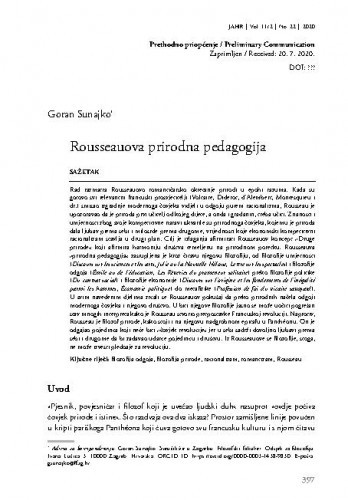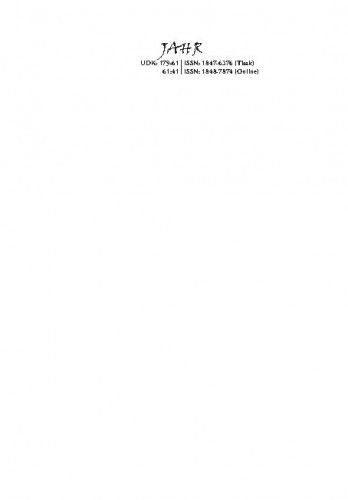Rad razmatra Rousseauovo romantičarsko okretanje prirodi u epohi razuma. Kada su gotovo svi relevantni francuski prosvjetitelji (Voltaire, Diderot, d'Alembert, Montesquieu i dr.) smisao izgradnje modernoga čovjeka vidjeli u odgoju putem racionalizma, Rousseau je upozoravao da je priroda prvi učitelj od kojeg dijete, a onda i građanin, treba učiti. Znanosti i umjetnosti zbog svoje kompetitivne naravi iskvarile su prirodnoga dovjeka, kojemu je priroda dala ljubav prema sebi i milosrđe prema drugome, vrijednosti koje ekonomski kompetitivni racionalizam stavlja u drugi plan. Cilj je izlaganja afirmirati Rousseauov koncept »Druge prirode« koji afirmira harmoniju društva temeljenu na prirodnom poretku. Rousseauva »prirodna pedagogija« zastupljena je kroz čitavu njegovu filozofiju, od filozofije umjetnosti (Discours sur les sciences et les arts; Julie ou la Nouvelle Héloïse; Lettre sur les spectacles) i filozofije odgoja (Émile ou de l’éducation; Les Rêveries du promeneur solitaire) preko filozofije politike (Du contrat social) i filozofije ekonomije (Discours sur l’origine et les fondements de l’inégalité parmi les hommes; Économie politique) do metafizike (Profession de foi du vicaire savoyard). U svim navedenim djelima zrcali se Rousseauov pokušaj da preko prirodnih načela odgoji modernoga čovjeka i njegovo društvo. U biti njegove filozofije jasno se može uočiti pogrešan stav mnogih interpreta kako je Rousseau stvorio pretpostavke Francuskoj revoluciji. Naprotiv, Rousseau je filozof prirode, kako stoji i na njegovu nadgrobnom epitafu u Panthéonu. On je odgajao pojedinca koji neće biti »čovjek revolucije« jer u sebi sadrži dovoljno ljubavi prema sebi i drugome da bi zadavao udarce pojedincu i društvu. Iz Rousseauove se filozofije, stoga, ne može izvesti pledoaje za revoluciju.; The paper deals with Rousseau’s romantic orientation to nature in the epoch of reason. When almost all relevant French enlightenment philosophers (Voltaire, Diderot, d’Alembert, Montesquieu, etc.) have seen the importance of building a modern man through rationalism, Rousseau warns that nature is the first teacher from whom a child, and therefore a citizen, should be taught. Because of their competitive nature, science and art have invaded a natural man whose nature gave him oneself-love and mercy toward the other; the values that economically competitive rationalism puts in a second plan. The aim of the presentation is to affirm Rousseau’s “Other Nature” concept which affirms the harmony of the natural-based society. Rousseau’s “natural pedagogy” is represented through his entire philosophy, from the philosophy of art (Discours sur les sciences et les arts, Julie ou Nouvelle Héloïse, Lettre sur les spectacles) and the philosophy of education (Émile ou de l’éducation, Les Rêveries du promeneur solitaire) through the political philosophy (Du contrat social) and the philosophy of economics (Discours sur l’origine et les fondements de l’inégalité parmi les hommes; Économie politique) to metaphysics (Profession de foi du vicaire savoyard). In all these works, Rousseau’s attempts to overcome the modern man and his society through natural principles are mirrored. From the essence of his philosophy, it is clearly possible to perceive the wrong attitude of many interpreters that Rousseau created the assumptions for the French Revolution. On the contrary, he is a philosopher of nature, as it is written on his tombstone epitaph in the Panthéon. He has raised an individual who will not be a “man of revolution” because he has enough love for himself and others to strike other individuals and society. From Rousseau’s philosophy, therefore, the call for revolution cannot be postulated.
Sažetak

 JAHR : europski časopis za bioetiku = European journal of bioethics : 11,22(2020) / glavni urednik, editor-in-chief Igor Eterović.
JAHR : europski časopis za bioetiku = European journal of bioethics : 11,22(2020) / glavni urednik, editor-in-chief Igor Eterović.